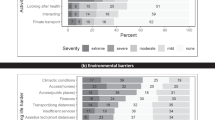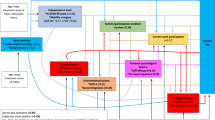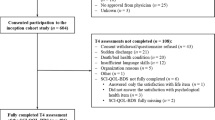Abstract
Study design:
Systematic review.
Objectives:
To review the literature on relationships between psychological factors and quality of life (QOL) of persons with spinal cord injury (SCI).
Setting:
NA.
Methods:
A systematic literature search was conducted in several online databases (PubMed, Embase and PsychInfo). Articles were included if they provided quantitative information on associations between QOL-related dependent variables and psychological factors as independent variables in an SCI population. The search was limited to empirical studies published in English. The methodological quality of the included articles was assessed.
Results:
A total of 48 studies were included. Total locus of control, sense of coherence, self-worth, hope, purpose in life and positive affect were consistently associated with greater QOL. Negative affect and posttraumatic cognitions were consistently associated with lower QOL. Inconsistent evidence was found for subscales of locus of control, the role of attribution of blame, spirituality, personality, appraisals, passive coping and emotion-focused coping. No evidence was found for an association between active problem-focused coping styles and QOL.
Conclusion:
Many psychological factors were strongly and consistently related to QOL, but for some others no or inconsistent evidence was found. Further research should (1) use larger study groups, preferably in longitudinal designs, (2) improve terminological precision and avoid conceptual overlap between determinants and outcomes, (3) increase uniformity of questionnaires and (4) reexamine concepts that have been abandoned prematurely, such as personality and social comparison.
Similar content being viewed by others
Log in or create a free account to read this content
Gain free access to this article, as well as selected content from this journal and more on nature.com
or
References
Glass C . Treatment and rehabilitation following spinal cord injury. Pers Injury Law Med Rev 1993; 38: 51–70.
Hammell KW . Exploring quality of life following high spinal cord injury: a review and critique. Spinal Cord 2004; 42: 494–502.
Post M, Noreau L . Quality of life after spinal cord injury. J Neurol Phys Ther 2005; 29: 139–146.
Wade DT . Describing rehabilitation interventions. Clin Rehabil 2005; 19: 811–818.
Dijkers PJ . Quality of life in individuals with spinal cord injury: a review of conceptualization, measurement, and research findings. J Rehabil Res Dev 2005; 42: 87–110.
North NT . The psychological effects of spinal cord injury: a review. Spinal Cord 1999; 37: 671–679.
Galvin LR, Godfrey HP . The impact of coping on emotional adjustment to spinal cord injury (SCI): a review of the literature and application of a stress appraisal and coping formulation. Spinal Cord 2001; 39: 615–627.
Chevalier Z, Kennedy P, Sherlock O . Spinal cord injury, coping and psychological adjustment: a literature review. Spinal Cord 2009; 47: 778–782.
Ogden J . Health Psychology.. Open University Press: Berkshire, 2004.
Kwakkel G, Wagenaar R, Kollen B, Lankhorst G . Predicting disability in stroke—a critical review of the literature. Age Ageing 1996; 25: 479–489.
Downs S, Black N . The feasibility of creating a checklist for the assessment of the methodological quality both of randomised and non-randomised studies of health care interventions. J Epidemiol Community Health 1998; 52: 377–384.
Cohen J . Statistical Power Analysis For The Behavioural Sciences, 2nd edn. Lawrence Erlbaum Associates, Hillsdale, NJ, UK, 1988.
Boschen K, Tonack M, Gargaro J . Long-term adjustment and community reintegration following spinal cord injury. Int J Rehabil Res 2003; 26: 157–164.
Chase B, Cornille T, English R . Life satisfaction among persons with spinal cord injuries. J Rehabil 2000; 66: 14–20.
Schulz R, Decker S . Long-term adjustment to physical disability: the role of social support, perceived control, and self-blame. J Pers Soc Psychol 1985; 48: 1162–1172.
Krause J, Stanwyck C, Maides J . Locus of control and life adjustment: relationship among people with spinal cord injury. Rehabil Couns Bull 1998; 41: 162–173.
Thompson N, Coker J, Krause J, Henry E . Purpose of life as a mediator of adjustment after spinal cord injury. Rehabil Psychol 2003; 48: 100–108.
Frank R, Elliott T . Spinal cord injury and health locus of control beliefs. Paraplegia 1989; 35: 250–256.
Frank R, Umlauf R, Wonderlich S, Askanazi G, Buckelew S, Elliott T . Differences in coping styles among persons with spinal cord injury: a cluster-analytic approach. J Consult Clin Psych 1987; 55: 727–731.
Chung M, Preveza E, Papandreou K, Prevezas N . The relationship between posttraumatic stress disorder following spinal cord injury and locus of control. J Affect Disord 2006; 93: 229–232.
Buckelew S, Baumstark K, Frank R, Hewett J . Adjustment following spinal cord injury. Rehabil Psychol 1990; 35: 101–109.
MacLeod L, MacLeod G . Control cognitions and psychological disturbance in people with contrasting physically disabling conditions. Disabil Rehabil 1998; 20: 448–456.
Waldron B, Benson C, O’Connell A, Byrne P, Dooley B, Burke T . Health locus of control and attributions of cause and blame in adjustment to spinal cord injury. Spinal Cord 2010; 48: 598–602.
Agar E, Kennedy P, King N . The role of negative cognitive appraisals in PTSD symptoms following spinal cord injuries. Behav Cogn Psychother 2006; 34: 437–452.
Hatcher M, Whitaker C, Karl A . What predicts post-traumatic stress following spinal cord injury? Br J Health Psychol 2009; 14: 541–561.
Reidy K, Caplan B . Causal factors in spinal cord injury: patients’ evolving perceptions and association with depression. Arch Phys Med Rehabil 1994; 75: 837–842.
Nielson W, MacDonald M . Attributions of blame and coping following spinal cord injury: is self-blame adaptive? J Soc Clin Psychol 1988; 7: 163–175.
Brown K, Bell M, Maynard C, Richardson W, Wagner G . Attribution of responsibility for injury and long-term outcome of patients with paralytic spinal cord trauma. Spinal Cord 1999; 37: 653–657.
Hanson S, Buckelew S, Hewett J, O’Neal G . The relationship between coping and adjustment after spinal cord injury: a 5-year follow-up study. Rehabil Psychol 1993; 38: 41–52.
Hansen N, Forchheimer M, Tate D, Luera G . Relationships among community reintegration, coping strategies, and life satisfaction in a sample of persons with spinal cord injury. Top Spinal Cord Inj Rehabil 1998; 4: 56–72.
Buunk A, Zurriaga R, González P . Social comparison, coping and depression in people with spinal cord injury. Psychol Health 2006; 21: 791–807.
O’Carroll R, Ayling R, O’Reilly S, North N . Alexithymia and sense of coherence in patients with total spinal cord transection. Psychosom Med 2003; 65: 151–155.
Kennedy P, Lude P, Elfström M, Smithson E . Cognitive appraisals, coping and quality of life outcomes: a multi-centre study of spinal cord injury rehabilitation. Spinal Cord 2010; 48: 762–769.
Kennedy P, Lude P, Elfström M, Smithson E . Sense of coherence and psychological outcomes in people with spinal cord injury: appraisals and behavioural responses. Br J Health Psychol 2010; 15: 611–621.
Kortte K, Gilbert M, Gorman P, Wegener S . Positive psychological variables in the prediction of life satisfaction after spinal cord injury. Rehabil Psychol 2010; 55: 40–47.
Smedema S, Catalano D, Ebener D . The relationship of coping, self-worth, and subjective well-being: a structural equation model. Rehabil Couns Bull 2010; 53: 131–142.
Kennedy P, Evans M, Sandhu N . Psychological adjustment to spinal cord injury: the contribution of coping, hope and cognitive appraisals. Psychol Health Med 2009; 14: 17–33.
Mortenson W, Noreau L, Miller W . The relationship between and predictors of quality of life after spinal cord injury at 3 and 15 months after discharge. Spinal Cord 2009, 1–7.
deRoon-Cassini T, de St Aubin E, Valvano A, Hastings J, Horn P . Psychological well-being after spinal cord injury: perception of loss and meaning making. Rehabil Psychol 2009; 54: 306–314.
Matheis E, Tulsky D, Matheis R . The relation between spirituality and quality of life among individuals with spinal cord injury. Rehabil Psychol 2006; 51: 265–271.
Forcheimer M, Tate D . The relationship of spirituality and depression to health among people with spinal cord injury. Top Spinal Cord Inj Rehabil 2007; 12: 23–34.
Kennedy P, Lowe R, Grey, N, Short E . Traumatic spinal cord injury and psychological impact: a cross-sectional analysis of coping strategies. Br J Clin Psychol 1995; 34: 627–639.
Kennedy P, Marsh N, Lowe R, Grey N, Short E, Rogers B . A longitudinal analysis of psychological impact and coping strategies following spinal cord injury. Br J Health Psychol 2000; 5: 157–172.
Pollard C, Kennedy P . A longitudinal analysis of emotional impact, coping strategies and post-traumatic psychological growth following spinal cord injury: a 10-year review. Br J Health Psychol 2007; 12: 347–362.
Tzonichaki I, Kleftaras G . Paraplegia from spinal cord injury: self-esteem, loneliness, and life satisfaction. OTJR Occup Participation Health 2002; 22: 96–105.
Coyle C, Lesnik-Emas S, Kinney W . Predicting life satisfaction among adults with spinal cord injuries. Rehabil Psychol 1994; 39: 95–112.
Hampton N . Disability status, perceived health, social support, self-efficacy, and quality of life among people with spinal cord injury in the People's Republic of China. Int J Rehabil Res 2001; 43: 69–71.
Hampton N . Subjective well-being among people with spinal cord injuries: the role of self-efficacy, perceived social support, and perceived health. Rehabil Couns Bull 2004; 48: 31–37.
Hampton N . Self-efficacy and quality of life in people with spinal cord injuries in China. Rehabil Couns Bull 2000; 43: 66–74.
Middleton J, Tran Y, Craig A . Relationship between quality of life and self-efficacy in persons with spinal cord injury. Arch Phys Med Rehabil 2007; 88: 1643–1648.
Elliott T, Godshall F, Herrick S, Witty T, Spruell M . Problem-solving appraisal and psychological adjustment following spinal cord injury. Cognit Ther Res 1991; 15: 387–398.
Shnek Z, Foley F, LaRocca N, Gordon W, DeLuca J, Schwartzman H et al. Helplessness, self-efficacy, cognitive distortions, and depression in multiple sclerosis and spinal cord injury. Ann Behav Med 1997; 19: 187–294.
Krause J, Rohe D . Personality and life adjustment after spinal cord injury: an exploratory study. Rehabil Psychol 1998; 43: 118–130.
Krause J, Dawis R . Prediction of life satisfaction after spinal cord injury: a four-year longitudinal approach. Rehabil Psychol 1992; 37: 49–60.
Martz E, Livneh H, Priebe M, Wuermser L, Ottomanelli L . Predictors of psychosocial adaptation among people with spinal cord injury or disorder. Arch Phys Med Rehabil 2005; 86: 1182–1192.
Kennedy P, Smithson E, McClelland M, Short D, Royle J, Wilson C . Life satisfaction, appraisals and functional outcomes in spinal cord-injured people living in the community. Spinal Cord 2010; 48: 144–148.
Wollaars M, Post M, van Asbeck F, Brand N . Spinal cord injury pain: the influence of psychologic factors and impact on quality of life. Clin J Pain 2007; 23: 383–391.
Elfström M, Ryden A, Kreuter M, Taft C, Sullivan M . Relations between coping strategies and health-related quality of life in patients with spinal cord lesion. J Rehabil Med 2005; 37: 9–16.
Migliorini C, Tonge B . Reflecting on subjective well-being and spinal cord injury. J Rehabil Med 2009; 41: 445–450.
Moore A, Bombardier C, Brown P, Patterson D . Coping and emotional attributions following spinal cord injury. Int J Rehabil Res 1994; 17: 39–48.
Brandtstädter J, Renner G . Tenacious goal pursuit and flexible goal adjustment: explication and age-related analysis of assimilative and accommodative strategies of coping. Psychol Aging 1990; 5: 58–67.
Author information
Authors and Affiliations
Corresponding author
Ethics declarations
Competing interests
The authors declare no conflict of interest.
Additional information
Supplementary Information accompanies the paper on the Spinal Cord website
Supplementary information
Rights and permissions
About this article
Cite this article
van Leeuwen, C., Kraaijeveld, S., Lindeman, E. et al. Associations between psychological factors and quality of life ratings in persons with spinal cord injury: a systematic review. Spinal Cord 50, 174–187 (2012). https://doi.org/10.1038/sc.2011.120
Received:
Revised:
Accepted:
Published:
Issue date:
DOI: https://doi.org/10.1038/sc.2011.120
Keywords
This article is cited by
-
Associations between personality traits and depressive and anxiety symptoms among persons with spinal cord injury in first inpatient rehabilitation
Spinal Cord (2024)
-
The contribution of bio-psycho-social dimensions on sexual satisfaction in people with spinal cord injury and their partners: an explorative study
Spinal Cord Series and Cases (2022)
-
Does the Danish version of the Spinal Cord Lesion-related Coping Strategies Questionnaire measure what we think it measures? A triangulated mixed-methods validation approach
Spinal Cord (2022)
-
Factor structure, measurement invariance and psychometric properties of the Quality of Life Scale WHOQOL-BREF in the Ecuadorian context
Psicologia: Reflexão e Crítica (2021)
-
Validation of the Persian version of Skindex-16 among older patients with skin diseases
BMC Geriatrics (2021)



